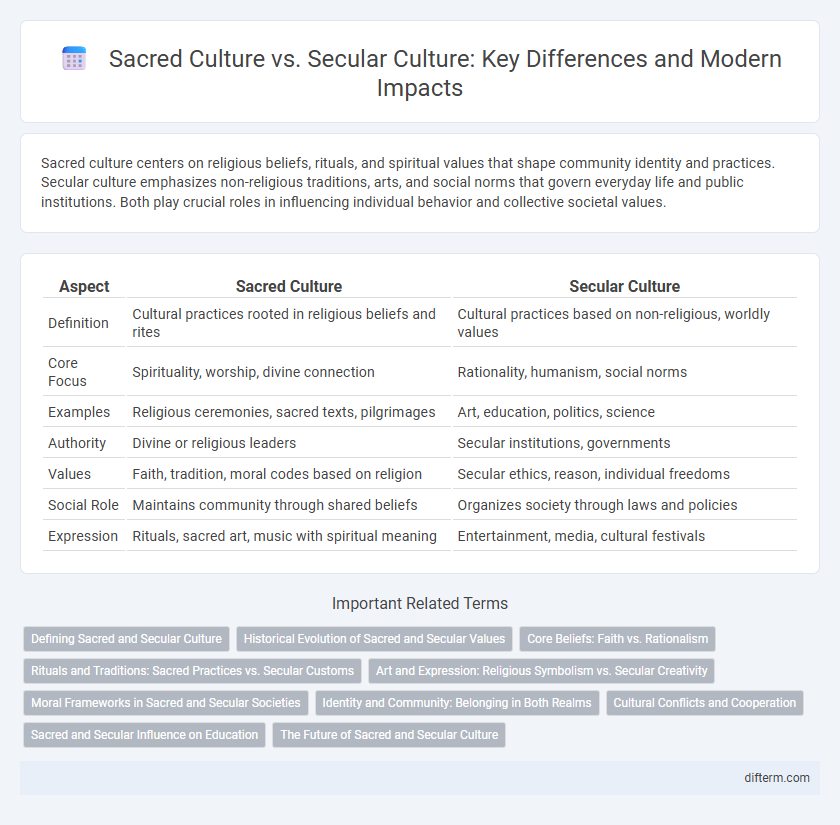Sacred culture centers on religious beliefs, rituals, and spiritual values that shape community identity and practices. Secular culture emphasizes non-religious traditions, arts, and social norms that govern everyday life and public institutions. Both play crucial roles in influencing individual behavior and collective societal values.
Table of Comparison
| Aspect | Sacred Culture | Secular Culture |
|---|---|---|
| Definition | Cultural practices rooted in religious beliefs and rites | Cultural practices based on non-religious, worldly values |
| Core Focus | Spirituality, worship, divine connection | Rationality, humanism, social norms |
| Examples | Religious ceremonies, sacred texts, pilgrimages | Art, education, politics, science |
| Authority | Divine or religious leaders | Secular institutions, governments |
| Values | Faith, tradition, moral codes based on religion | Secular ethics, reason, individual freedoms |
| Social Role | Maintains community through shared beliefs | Organizes society through laws and policies |
| Expression | Rituals, sacred art, music with spiritual meaning | Entertainment, media, cultural festivals |
Defining Sacred and Secular Culture
Sacred culture encompasses beliefs, rituals, and symbols rooted in spiritual or religious significance, often guiding moral values and community cohesion. Secular culture, by contrast, centers on non-religious aspects of society, emphasizing science, education, art, and civic life. Understanding the distinction highlights how sacred culture influences identity and tradition, while secular culture fosters pluralism and modern social structures.
Historical Evolution of Sacred and Secular Values
Sacred culture historically emerged from religious beliefs and rituals, shaping societies through divine authority and spiritual practices deeply embedded in ancient civilizations. Secular culture evolved over centuries alongside the rise of rationalism, scientific inquiry, and political movements such as the Enlightenment, promoting values based on human reason and empirical evidence rather than divine mandate. The historical evolution of sacred and secular values reflects a dynamic interplay between tradition and modernization, influencing legal systems, educational frameworks, and social norms globally.
Core Beliefs: Faith vs. Rationalism
Sacred culture centers on core beliefs rooted in faith, divine authority, and spiritual traditions that guide moral values and community practices. Secular culture emphasizes rationalism, scientific inquiry, and empirical evidence as the foundation for knowledge, ethics, and social organization. The tension between faith-based and reason-based worldviews shapes cultural identity, legal systems, and educational frameworks worldwide.
Rituals and Traditions: Sacred Practices vs. Secular Customs
Sacred culture encompasses rituals and traditions deeply rooted in religious beliefs, often involving ceremonies, prayers, and symbolic acts that connect participants to the divine or spiritual realm. Secular culture features customs and practices that reflect societal values and collective identity without explicit religious significance, such as national holidays, cultural festivals, and community gatherings. Both sacred and secular rituals play crucial roles in maintaining social cohesion, preserving heritage, and fostering a sense of belonging among individuals.
Art and Expression: Religious Symbolism vs. Secular Creativity
Sacred culture emphasizes art and expression deeply intertwined with religious symbolism, using motifs like crosses, mandalas, and icons to convey spiritual narratives and divine presence. Secular culture prioritizes creativity driven by human experience, experimentation, and social commentary, embracing diverse mediums such as abstract painting, contemporary sculpture, and digital art. The coexistence of sacred and secular art forms highlights differing approaches to meaning-making, where sacred art fosters spiritual connection and secular art reflects cultural and individual identity.
Moral Frameworks in Sacred and Secular Societies
Sacred cultures derive their moral frameworks primarily from religious doctrines and spiritual beliefs, providing absolute values that govern behavior and social norms. Secular cultures base their ethical systems on reason, human rights, and social contracts, allowing for more flexible and adaptive moral guidelines. This distinction influences how societies address justice, individual responsibility, and community cohesion.
Identity and Community: Belonging in Both Realms
Sacred culture shapes identity through shared spiritual beliefs and rituals that foster a deep sense of belonging within religious communities. Secular culture, rooted in common values and social practices, forms inclusive identities that unite people beyond spiritual boundaries. Both realms contribute to community cohesion by providing frameworks for connection, purpose, and collective identity.
Cultural Conflicts and Cooperation
Sacred culture, rooted in religious beliefs and spiritual practices, often emphasizes rituals, traditions, and moral codes that shape community identity. Secular culture centers on non-religious values, scientific understanding, and pluralism, promoting individual rights and social progress. Cultural conflicts arise when sacred norms clash with secular ideals, but cooperation emerges through intercultural dialogue, mutual respect, and legal frameworks that balance religious freedom with secular governance.
Sacred and Secular Influence on Education
Sacred culture profoundly shapes education by embedding religious values, rituals, and moral frameworks into curricula, fostering spiritual development and ethical awareness. Secular culture, in contrast, emphasizes empirical knowledge, critical thinking, and scientific inquiry, promoting inclusivity and neutrality in diverse educational settings. The interplay between sacred and secular influences determines curriculum design and pedagogical approaches, balancing tradition with modernity to address cultural and societal needs.
The Future of Sacred and Secular Culture
The future of sacred and secular culture hinges on the evolving relationship between traditional spiritual values and modern societal norms, where technology and globalization play pivotal roles. As secular culture increasingly embraces scientific rationalism and individualism, sacred culture adapts by integrating contemporary practices while preserving core religious rituals and symbols. This dynamic interplay fosters cultural pluralism, encouraging dialogue and coexistence between diverse worldviews in an interconnected society.
sacred culture vs secular culture Infographic

 difterm.com
difterm.com